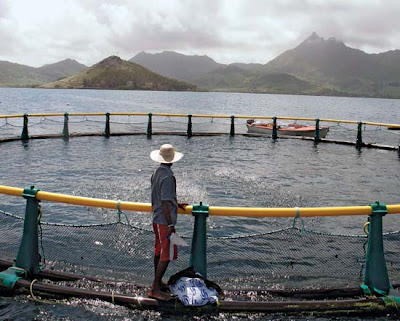
ScienceDaily — Industrial-scale aquaculture production magnifies environmental degradation, according to the first global assessment of the effects of marine finfish aquaculture (e.g. salmon, cod, turbot and grouper) released Oct. 27, 2010. This is true even when farming operations implement the best current marine fish farming practices, according to the findings.
Dr. John Volpe and his team at the University of Victoria developed the Global Aquaculture Performance Index (GAPI), an unprecedented system for objectively measuring the environmental performance of fish farming.
"Scale is critical," said Dr. Volpe, a marine ecologist. "Over time, the industry has made strides in reducing the environmental impact per ton of fish, but this does not give a complete picture. Large scale farming of salmon, for example, even under even the best current practices creates large scale problems."
The fish farming industry is an increasingly important source of seafood, especially as many wild fisheries are in decline. Yet farming of many marine fish species has been criticized as causing ecological damage. For instance, the researchers' found that the relatively new marine finfish aquaculture sector in China and other Asian countries lags in environmental performance.
Dr. Volpe added, "The fastest growing sector is Asia, where we found a troubling combination of poor environmental performance and rapidly increasing production."
With support from the Lenfest Ocean Program, Dr. Volpe and his team developed GAPI, which uses 10 different criteria to assess and score environmental impacts. Incorporating information such as the application of antibiotics and discharge of water pollutants, GAPI allows researchers to gauge which farmed species and countries of production have the best or worst environmental performance. The researchers examined the environmental impact of marine fish farming per ton of fish produced and the cumulative environmental impact for each country producing a major farmed species.
"GAPI provides a valuable tool for developing environmentally responsible fish farming. Governments can use GAPI to inform policies and regulations to minimize the environmental footprint of fish farming. Farmers can use it to improve production practices. And buyers can use it to compare and select better, more environmentally friendly seafood options," said Chris Mann, senior officer and director of the Pew Environment Group's Aquaculture Standards Project, which collaborated on the work.
For further information on GAPI, including a summary of the methodology and findings, please visit www.lenfestocean.org.
The GAPI 2010 report released Oct. 27 is based on 2007 data, the most recent year for which data for all aquaculture indicators are available. GAPI analysis will be updated periodically as additional data becomes available. For additional information, updated research and analysis, please see the GAPI Web site (www.gapi.ca).
The Lenfest Ocean Program supports scientific research aimed at forging solutions to the challenges facing the global marine environment. The program was established in 2004 by the Lenfest Foundation and is managed by the Pew Environment Group.
The University of Victoria, located in Victoria, British Columbia is a national and international leader in the study of the oceans, with expertise as far-ranging as ocean-climate interactions, ocean observation systems, physical and chemical oceanography, marine ecology, coastal resource management and ocean engineering.
Source: http://www.sciencedaily.com/releases/2010/10/101027092201.htm
About Oceanic Defense
We are an international non-profit organization with members in over 60 countries, spanning 6 continents with 1 mission; healthy aquatic ecosystems free from human abuse and neglect. Oceanic Defense teaches people to protect our oceans by acting responsibly as consumers and by making smart decisions in our daily lives. Whether we are buying groceries, commuting to work, planning a vacation or advocating within our own communities; each action we take or decision we make either helps or hurts our oceans. We empower people to be part of the solution rather than part of the problem and work together to protect our blue planet.
Join us on Facebook:www.facebook.com/OceanicDefense
Visit our official website:www.oceanicdefense.org
Follow us on Twitter:www.twitter.com/OceanicDefense

No comments:
Post a Comment